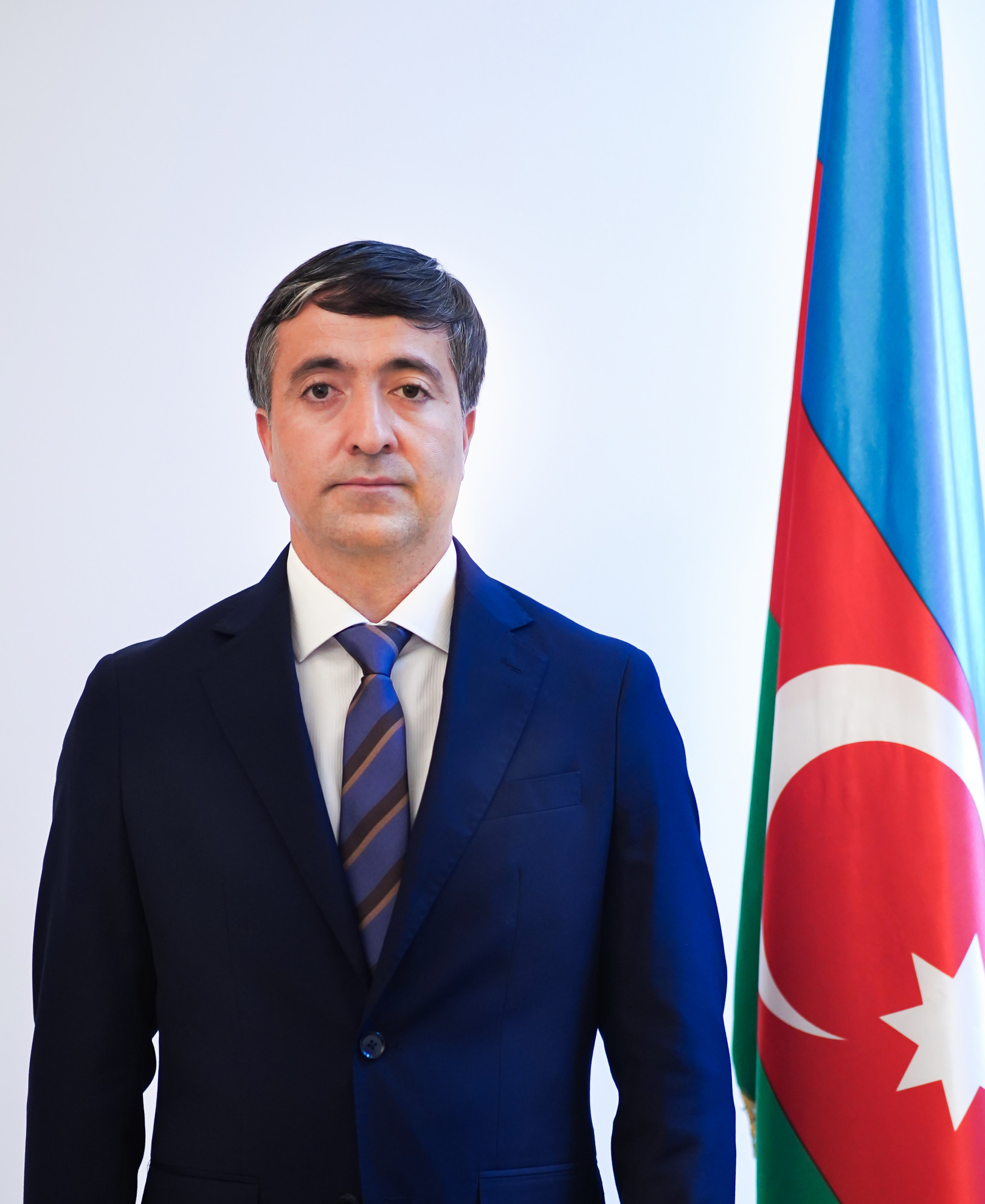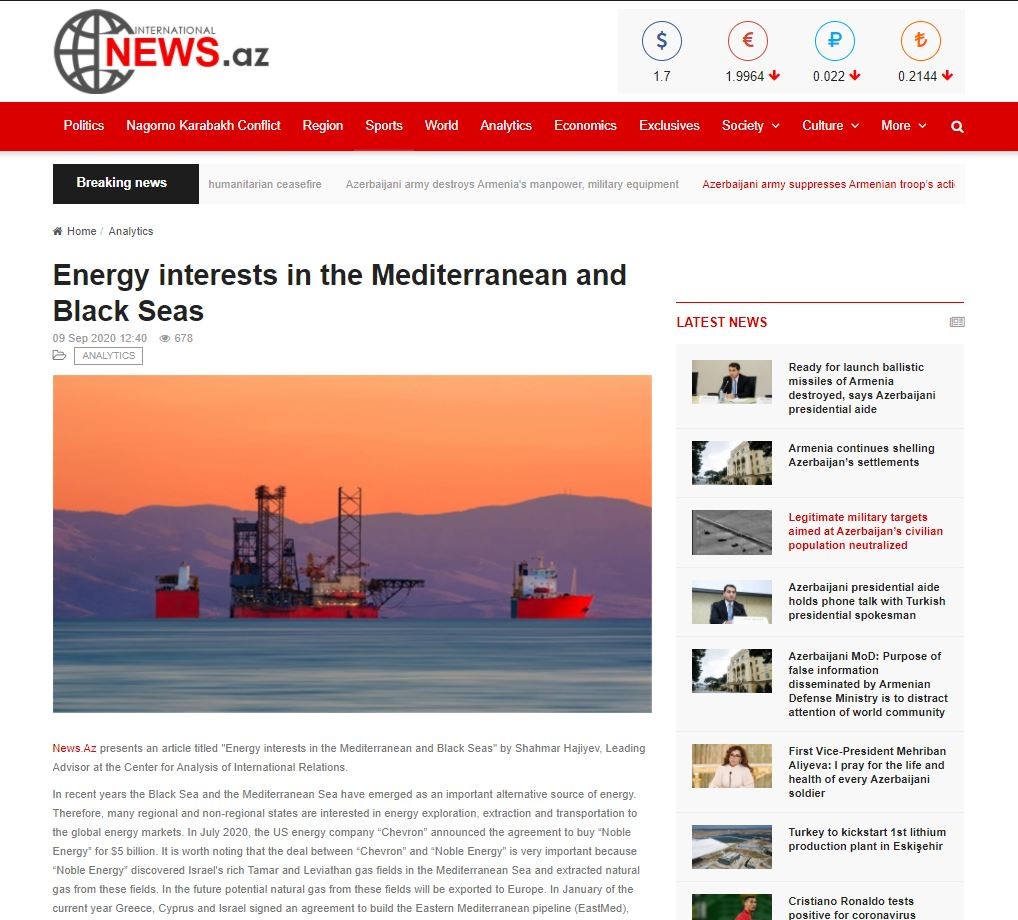In recent years the Black Sea and the Mediterranean Sea have emerged as an important alternative source of energy. Therefore, many regional and non-regional states are interested in energy exploration, extraction and transportation to the global energy markets. In July 2020, the US energy company “Chevron” announced the agreement to buy “Noble Energy” for $5 billion. It is worth noting that the deal between “Chevron” and “Noble Energy” is very important because “Noble Energy” discovered Israel's rich Tamar and Leviathan gas fields in the Mediterranean Sea and extracted natural gas from these fields. In the future potential natural gas from these fields will be exported to Europe. In January of the current year Greece, Cyprus and Israel signed an agreement to build the Eastern Mediterranean pipeline (EastMed), which will be able to transport 10 bcm/a of natural gas from the Eastern Mediterranean to the European energy market.
“EastMed” pipeline will run from Israel's Levantine Basin offshore gas reserves to Cyprus, the Greek island of Crete then the Greek mainland and Italy. Basically, it will connect Israeli energy infrastructure to the European gas infrastructure, and the pipeline is scheduled to be completed by 2025. In this regard, “Chevron”s agreement with “Noble Energy” is quite interesting for the state of Israel, because this energy deal will further strengthen Israel’s position. Israel’s main goal is to export natural gas to the European energy consumers from the energy fields in the Mediterranean Sea. By doing that, Israel can become an important energy player in the region, secure significant economic benefits as well as strengthen relationships with European countries. In addition, potential Israeli-Egyptian energy cooperation will also enable the delivery of natural gas from Egypt’s rich Zohr gas field in the Mediterranean Sea.
As one can see Chevron’s decision aims to speed up the implementation of energy projects in the Mediterranean, and more importantly, could be construed as a potential conflict of interest in the region. Turkey being a strong regional country has own interests in the Mediterranean. Turkey has already begun drilling in search of energy resources in the region. The agreement on maritime boundaries signed between Libya’s internationally recognized government and Turkey on November 27, 2019 clearly illustrates the geopolitical power struggle between the regional states.
It should be also highlighted that decline in energy demand and alternative gas sources in the European gas market affected price policy. Europe is diversifying its natural gas sources and routes by supporting various projects to reduce its high dependence on one source. Increased LNG supply also makes gas prices more competitive. In general, the increase of alternative sources in the energy market is accompanied by a decrease in the market share of Russian gas.
Important news in the energy industry was the statement of the Turkish President Recep Tayyip Erdogan on August 21 about the discovery of large natural gas reserves in the Black Sea. As it was mentioned above, energy projects play an important role in both the Black and Mediterranean Seas, therefore, official Ankara has accelerated operations, and Turkey’s drilling ship Fatih has found 320 bcm of natural gas in the Black Sea. In this context, the main issue is the timeline of potential production. According to the official sources, the process may happen in 2023. However, it should be underlined that after assessment of the field, depending on characteristics as well as the necessary infrastructure, it can take even more time.
It must be specifically noted that the natural gas sector is one of the most important sectors for Turkey because this sector affects the economic development of the country. Analyzing the Turkish domestic gas market, one can see that the country historically has a high dependency rate on energy imports. In 2019, 45.285 bcm of natural gas was consumed, and a large share of about 71.29% was imported via gas pipelines. Russia was the largest (33.61%) exporter of natural gas to the Turkish energy market. However, the share of Russian gas decreased in 2020. The increase of LNG imports and pipeline gas supplies, mainly from Azerbaijan played a significant role. For example, about 6.3 bcm of Azerbaijani gas entered the Turkish energy market during January-July 2020, which was 24% more than the last year.
The discovery of Turkey's own natural gas field was very important from a geopolitical standpoint. Firstly, despite all the pressure, Turkey has maintained its interest in the region, and eventually discovered a gas reserve. This step proved once again Turkey’s determination to other countries. Secondly, the process itself is very important in terms of diversification. Turkey has always imported natural gas from other energy-exporting countries. The domestic energy market has a high dependency rate, and the price ration was not favorable for the country. For example, in the first half of this year, Turkey paid around $250-280 for Russian gas, although the price of Russian gas in Europe fell to $110-120.
Azerbaijani gas supplies and LNG imports have further stabilized the gas market. Now, diversification of gas sources is an important issue for the country, and the discovery of 320 bcm of gas field will give Turkey an additional incentive to reach better gas price agreements as well as further reduce its dependence.
Azerbaijani natural gas has already entered the Turkish gas market via the TANAP pipeline, and the volume of gas supplies will be increased in the future. Towards this end, Azerbaijani natural gas must further strengthen its position in the Turkish energy market. It should be also noted that Azerbaijani natural gas is favorable for Turkey, and increasing the volume of gas in the Turkish energy market is beneficial for both countries. SOCAR has already involved in upstream, midstream, and downstream operations, so that the Star Oil Refinery enables Azerbaijan to play an important role in the Turkish energy sector.
All the above-mentioned show that the confrontation between the regional countries for search and extraction of energy resources in the Eastern Mediterranean area has intensified. The deterioration of relations between two NATO members – Turkey and Greece could escalate the conflict in the region, and even open support for Greece by some NATO members such as France and Italy is quite dangerous. It seems that the rich energy resources of the region may lead to a potential conflict escalation in the future. Turkey is determined to ensure security by increasing its military presence in the Mediterranean and the Black seas.
In conclusion, Azerbaijan fully supports Turkey in the Eastern Mediterranean area, and as President Ilham Aliyev emphasized “Turkey is not only our friend and partner but also a brotherly country for us. Without any hesitation whatsoever, we support Turkey and will support it under any circumstances”. This approach confirms once again that Azerbaijan and Turkey will always support each other on all issues in the international arena.
https://news.az/news/energy-interests-in-the-mediterranean-and-black-seas








